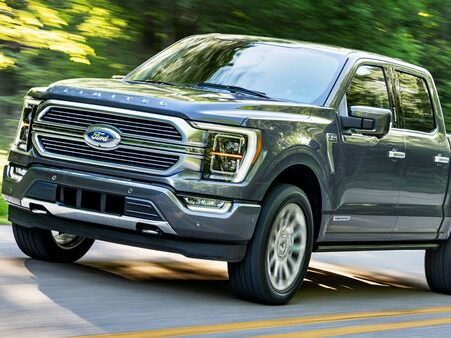The Ford F-Series has long been an icon of American automotive prowess, dominating the pickup truck market for decades. However, recent trends suggest that its once-unassailable position may be facing a significant challenge. Despite its enduring popularity and loyal fan base, the F-Series is encountering a decline in market share, raising questions about the future of Ford’s flagship truck line.

One of the key factors contributing to the F-Series’ diminishing market share is increased competition within the pickup truck segment. Traditionally, the F-Series faced limited competition from domestic rivals such as Chevrolet and Dodge. However, in recent years, foreign automakers like Toyota and Nissan have entered the fray with their own full-size pickup offerings, intensifying competition in the market. These new players have introduced innovative features, improved fuel efficiency, and competitive pricing, enticing consumers away from the F-Series.
Moreover, the rise of electric vehicles (EVs) presents a unique challenge to traditional gas-powered trucks like the F-Series. With growing concerns about climate change and environmental sustainability, many consumers are gravitating towards electric alternatives. While Ford has announced plans to release an all-electric version of the F-150, the F-Series currently lacks a dedicated electric option, putting it at a disadvantage in the evolving automotive landscape.
Another factor contributing to the F-Series’ declining market share is shifting consumer preferences. In recent years, there has been a growing demand for smaller, more fuel-efficient vehicles, driven in part by rising fuel prices and environmental awareness. This trend has led some consumers to opt for smaller trucks or crossover SUVs instead of full-size pickups like the F-Series. Additionally, changing demographics, including the preferences of younger buyers who prioritize technology and connectivity in their vehicles, have also impacted the F-Series’ appeal.
In addition to external market forces, internal challenges within Ford may be contributing to the F-Series’ struggles. The company has faced criticism for its perceived lack of innovation and failure to keep pace with competitors in terms of technological advancements and features. While the F-Series remains a reliable and capable workhorse, it has been criticized for its outdated interior design, limited safety features, and lack of driver-assistance technology compared to rivals.
Furthermore, supply chain disruptions and production challenges have hampered Ford’s ability to meet demand for the F-Series, further exacerbating its decline in market share. The COVID-19 pandemic, in particular, disrupted global supply chains and forced automakers to halt production temporarily, leading to inventory shortages and delayed deliveries. These disruptions have allowed competitors to gain ground and capture market share that might otherwise have gone to the F-Series.
To address these challenges and regain lost ground, Ford must take decisive action to revitalize the F-Series and restore its competitive edge. This could involve investing in research and development to introduce new features and technology, expanding the F-Series lineup to appeal to a broader range of consumers, and accelerating the development of electric and hybrid options to meet evolving market demands.
Additionally, Ford should prioritize improving its supply chain resilience to mitigate future disruptions and ensure consistent availability of the F-Series to meet customer demand. By taking proactive steps to address both internal and external challenges, Ford can position the F-Series for long-term success and maintain its status as a dominant force in the pickup truck market.
In conclusion, while the Ford F-Series has long been a symbol of American automotive excellence, it is facing a challenging road ahead as it contends with declining market share. By adapting to changing consumer preferences, investing in innovation, and addressing internal inefficiencies, Ford can revitalize the F-Series and secure its position as a leader in the pickup truck segment for years to come.
